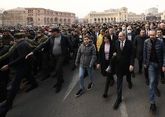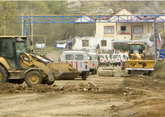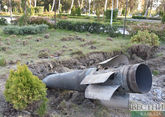Armenia's "Revolutionary Leader" and Prime Minister Nikol Pashinyan, speaking today at the 74th session of the UN General Assembly in New York, de facto refused to conduct negotiations on a peaceful settlement of the Nagorno-Karabakh conflict - only two days after the meeting of Azerbaijani and Armenian Foreign Ministers Elmar Mammadyarov and Zohrab Mnatsakanyan.
In fact, Pashinyan repeated the same theses he voiced a year ago at the 73rd session of the UN General Assembly, with one exception: if the Armenian prime minister tried to play on the threat of a new 'Armenian genocide' in Karabakh, then today it occurred to him present the legal restoration of the territorial integrity of Azerbaijan as Baku’s dream of restoring the USSR. "They want to bring back Nagorno-Karabakh’s status in Soviet times... This position of Baku is tantamount to the idea of restoring the Soviet Union," Pashinyan said, apparently in an attempt to use the anti-Russian sentiments of the West.
Once again, he used the arguments of his political enemies, the instigators of the Nagorno-Karabakh conflict, ex-presidents Robert Kocharian and Serzh Sargsyan about the "Karabakh people" who allegedly left the USSR by constitutional means, according to the right of nations to self-determination - and again Pashinyan did not say a word about that by the time of the December 10, 1991 referendum, the ethnic cleansing had been carried out in Karabakh against the Azerbaijani community, which amounted to about 20% of the Karabakh population. Armenia never mentions at the international level that it killed and expelled part of the Karabakh people with its own hands, because it means that the mono-ethnic population in the occupied territories of Azerbaijan cannot be called the 'Karabakh people' and realize any national rights.
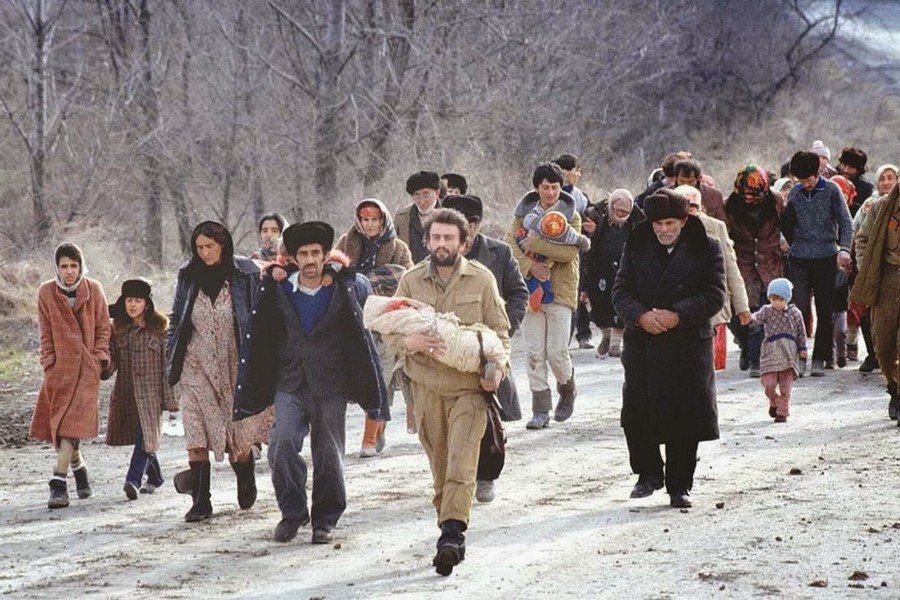
Victims of ethnic cleansing in Karabakh
Pashinyan is in no hurry to talk about his predecessors' crimes against humanity, because it destroys all his rhetoric. The myth of the "Karabakh people" as an independent subject of the Nagorno-Karabakh conflict allows him to drag out peace negotiations even more effectively than Kocharian and Sargsyan did: the new Armenian prime minister simply refuses to negotiate with Azerbaijan as a party to the conflict, demanding mediator status for Armenia, and in exchange, proposes to put the puppet regime of the Karabakh separatists at the negotiating table.
Pashinyan is perfectly fine with the fact that these requirements cancel all decades of diplomatic efforts to resolve the Nagorno-Karabakh conflict by both parties to the conflict and international mediators represented by the OSCE Minsk Group: in this way he may present Baku’s refusal to change the format of negotiations as "unwillingness to compromise" and base on it arbitrary conclusions, for example, about Azerbaijan’s desire to "take revenge on the Karabakh people".
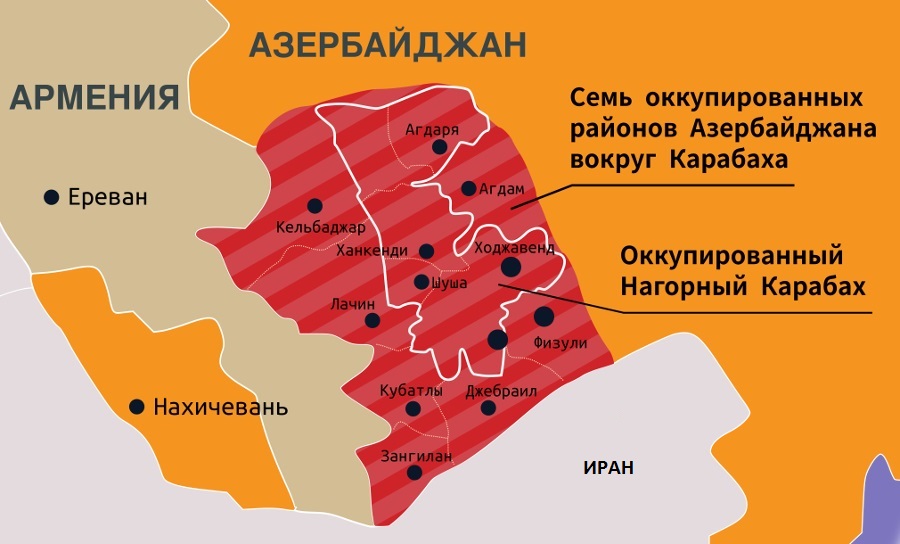
Map of the Azerbaijani territories occupied by Armenia
Pashinyan once again turned the principle of restoring the territorial integrity of Azerbaijan into the idea of a "territory without people": "Baku presents the Nagorno-Karabakh conflict as a territorial dispute between Armenia and Azerbaijan. We do not agree with this interpretation of the conflict. This dispute is not about territorial claims. It is about people - men, women - and their right to live in their homeland, just as their ancestors lived there for centuries. Unfortunately, Azerbaijani authorities do not want to talk with these people, because they need territories, not people."
And again he said nothing about the Karabakh Azerbaijanis, "about men and women, whose right to live in their homeland, just as their ancestors lived there for centuries," was trampled by Yerevan 30 years ago and still not recognized. Pashinyan also did not talk about hundreds of thousands of Azerbaijanis who were expelled by Armenian forces from the Azerbaijani regions surrounding Karabakh, where no "Karabakh people" lived. Yerevan is not interested in their right to live in their homeland, and in this regard, the Prime Minister’s speech about interest in a “territory without people" sounds like self-incrimination - the occupied Azerbaijani regions have remained destroyed, devastated and deserted for decades.
.jpg)
Agdam (Karabakh)
A bunch of lies and non-disclosures based on the myth of the "Karabakh people" showed that being the prime minister for a year and a half gave Nikol Pashinyan a sense of impunity for any of his statements on the Nagorno-Karabakh settlement. But it is not because Yerevan is supported by an influential part of the Armenian diaspora in the co-chairing countries of the OSCE Minsk Group and not because of Armenia's official status as a strategic ally of Russia: both the diaspora and Russia have many complaints against the new Armenian authorities. The fact is that both Baku and the mediators understand that it is impossible to negotiate with Pashinyan, and therefore his words have no weight, despite his high position.
The second speech of Nikol Pashinyan at the UN General Assembly drops the curtain in answering the question of his position on the Nagorno-Karabakh settlement. The Armenian Prime Minister confirmed that he refuses to participate in the settlement and demands to reset the whole process. He knows that neither Azerbaijan nor the OSCE Minsk Group will agree to change approaches to the conflict. From his point of view, this is an ideal plan to maintain the status quo forever - however, in reality, Pashinyan isolates himself from the diplomatic work and ceases to be the subject of negotiations.
This raises the question of who will conduct substantive negotiations on behalf of Armenia, if not the head of state - and most importantly, what are the prospects for a peaceful settlement, if no one else in Yerevan takes this responsibility? So far, it can be said with confidence that today Pashinyan has abdicated all responsibility.


